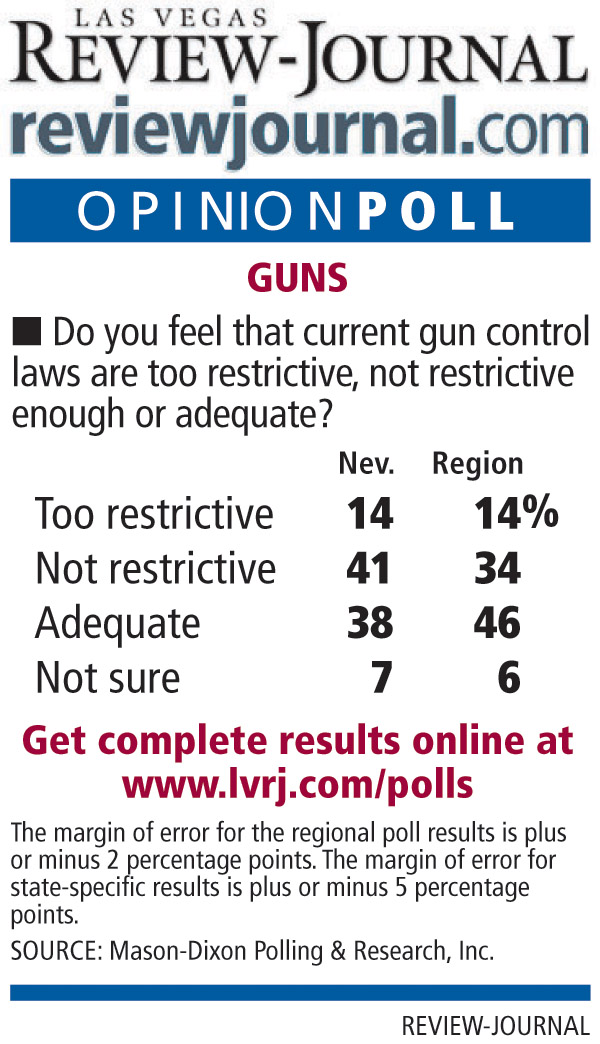Gun control debate cools off
CARSON CITY -- The never-ending battle between gun control supporters and Second Amendment advocates has nearly fallen off the charts as a significant issue either in Nevada or the West, a Review-Journal poll says.
Water issues, immigration and climate change all rate much higher as concerns for residents of Nevada, as well as neighboring Western states including Arizona, Colorado, New Mexico, Utah and Wyoming, according to the poll by Washington, D.C.-based Mason-Dixon Polling & Research Inc.
Although the issue rates low in importance, cited by only 2 percent of both Nevadans and Western residents polled on a variety of issues, the consensus appears to be satisfaction with the level of gun control now in place, said Brad Coker, the polling firm's managing partner.
The Nevada poll results show that 14 percent believe current state gun control laws are too strict, with 41 percent saying not restrictive enough and 38 percent viewing them as adequate. The remainder are not sure.
Regionally among the six states, the numbers are 14 percent viewing their laws as too restrictive, 34 percent not restrictive enough and 46 percent as adequate with the rest not sure.
Coker said that for the purposes of political analysis, those viewing gun laws as adequate can be combined with those viewing them as too restrictive, meaning that gun control is likely to be a status quo issue in Nevada and Western state legislatures, he said.
"The demand for change is not there," Coker said. "Those who want to push gun control will have problems in the West."
The regional poll was commissioned by the Review-Journal, the Denver Post and the Salt Lake Tribune. The margin of error for the regional poll results is plus or minus 2 percentage points.
The Nevada component of the poll of 400 likely voters was conducted Aug. 13 to 15. The margin for error is plus or minus 5 percentage points.
One Nevada resident who participated in the poll, Lou Schettino of Las Vegas, said he would like tougher gun laws, to the point where handgun ownership would be banned. He was among the 41 percent of Nevadans who said gun laws are not restrictive enough.
"And I'm a Republican," he said. "My son was a policeman in New York City. As far as I am concerned, we need to take handguns off the street."
Schettino said he has heard constant stories from his son about random and senseless killings involving handguns.
"I feel for any policeman or the family of a police officer," Schettino said.
Coker said gun issues in state legislatures now appear to address more tangential subjects, such as concealed weapons permits.
"The issues are around the edges," he said. "No one is saying repeal the Brady Bill or do away with waiting periods."
Nevada state Sen. Bob Beers, R-Las Vegas, who in 2007 proposed a bill that would have allowed teachers with the appropriate training to carry concealed weapons on school grounds, said gun-related legislation is more focused now on narrow issues rather than the big debates over gun rights.
"Nationally there is fairly broad Republican and Democratic support for the Second Amendment," Beers said.
The issues that come up have more to do with tweaking existing laws, such as the recent discussion of reciprocity between states on the ability of their properly trained and authorized citizens to carry concealed weapons in other jurisdictions, Beers said.
When gun-related legislation comes up, there is less citizen reaction to it, either positive or negative, than there has been in previous years, he said.
Beers said he does not know whether he will try again with his bill to allow teachers to carry weapons, which was proposed both to counter potential terrorism and as a deterrent to school violence. The measure failed on a 4-2 vote in a Senate committee last year.
Contact Sean Whaley at swhaley@review journal.com or 775-687-3900.

















